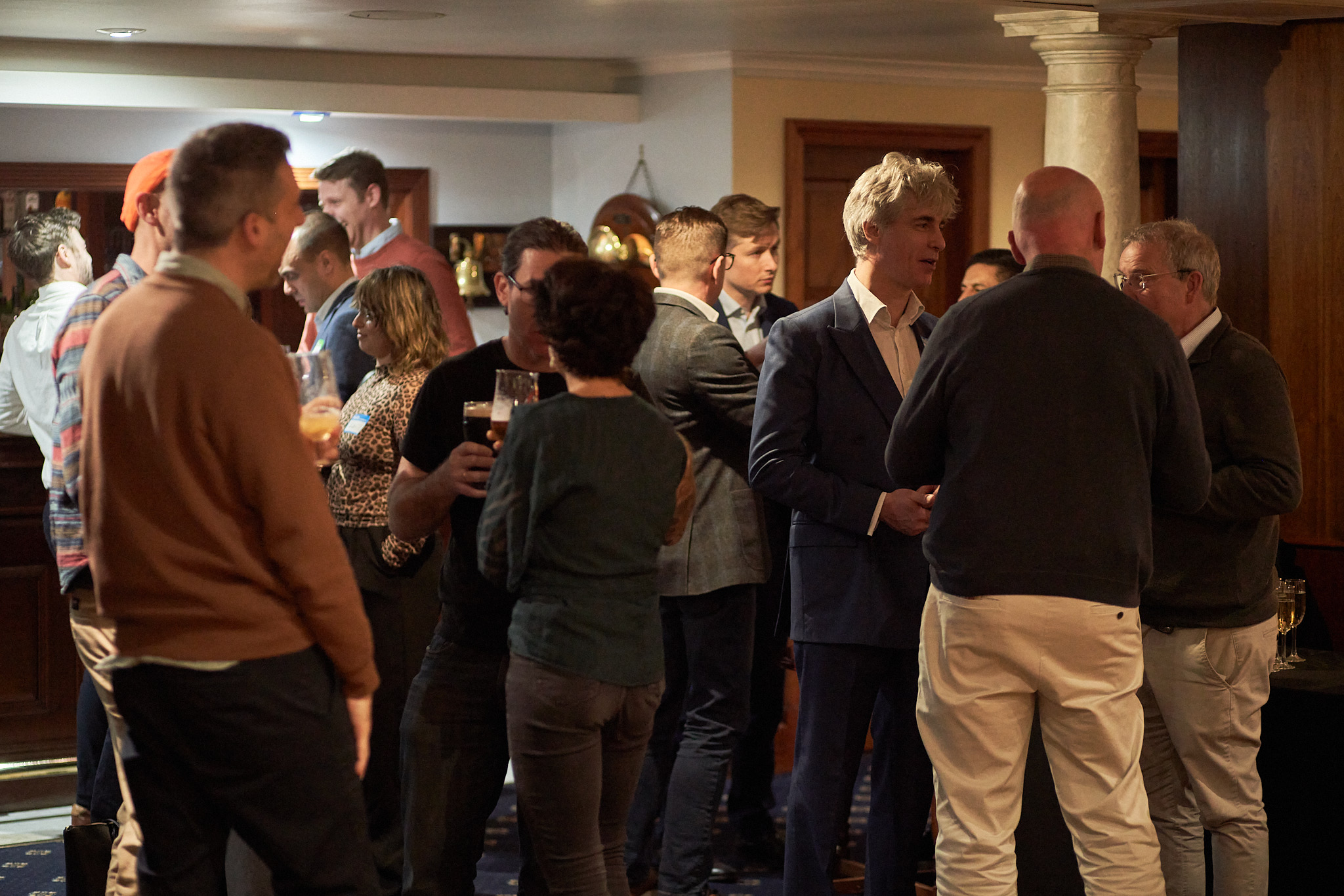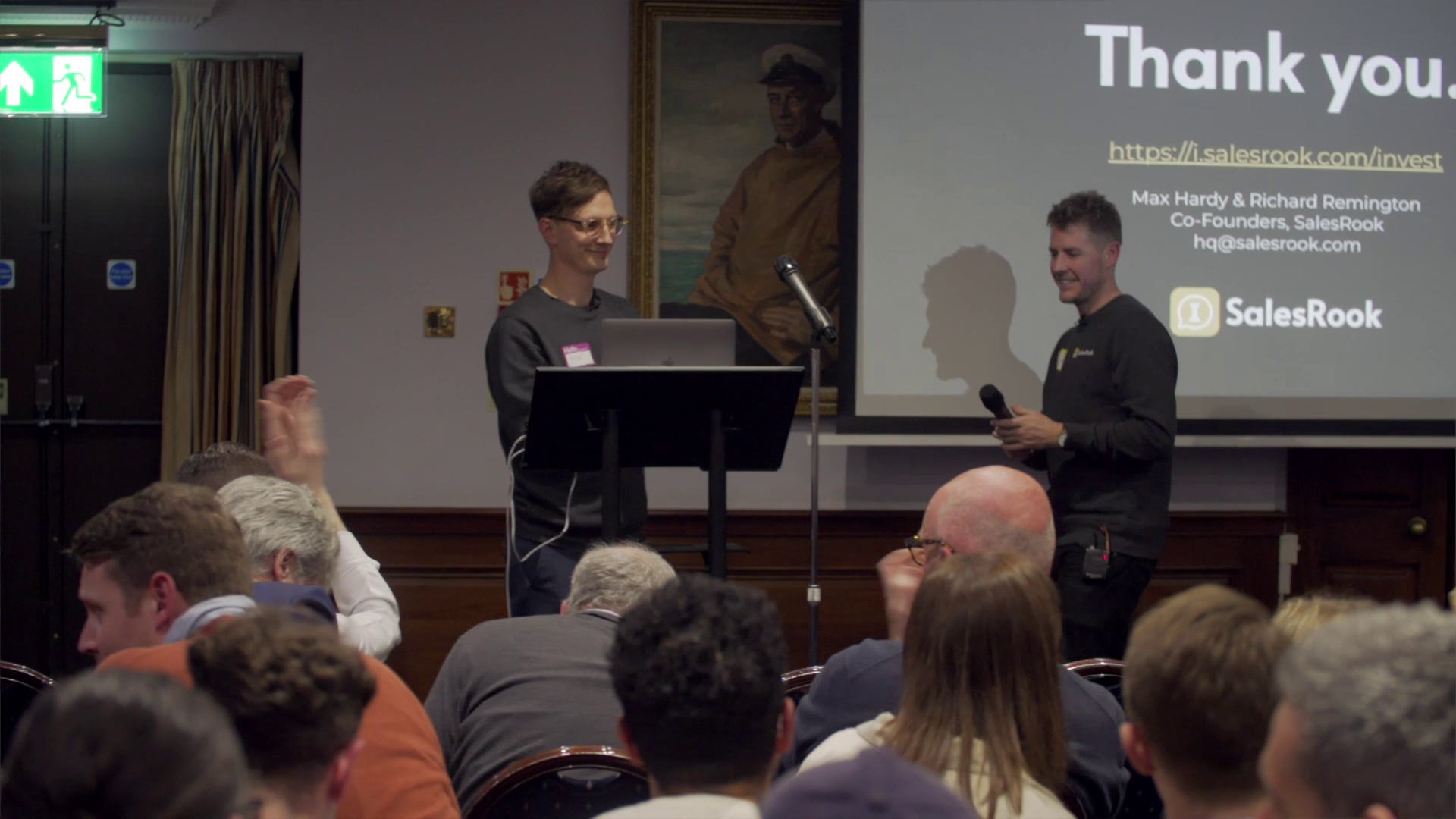
An Evening by the Thames: How Property Professionals Are Reimagining AI's Role
An Evening by the Thames: How Property Professionals Are Reimagining AI's Role
 🎥 Dive into the Evening: SalesRook's PropTech Innovation Showcase
🎥 Dive into the Evening: SalesRook's PropTech Innovation Showcase
Can't see the video? Click here to watch on YouTube.
The Thames lapped quietly against the hull of the Little Ship Club, seemingly unaware that inside, a revolution was brewing. It wasn't the kind of revolution marked by raised fists or inflammatory speeches, but something far more subtle—and potentially more transformative.
The room hummed with that particular energy unique to gatherings where something important is about to happen.
Glasses clinked.
Conversations rose and fell like gentle waves.
Property veterans in tailored blazers stood shoulder-to-shoulder with tech enthusiasts whose branded sweaters betrayed a different kind of uniform. Old school met new school, and nobody was quite sure who was about to school whom.
Mal McCallion was holding court near the window, his opening talk on AI in PropTech still hanging in the air like a challenge. Representatives from Martyn Gerrard, Richard James, and Berkshire Hathaway exchanged knowing glances—the kind that suggest they've seen industries transform before, but never quite like this.
"It's not about replacing people," I overheard Richard Remington—Remi to everyone in the room—saying to a cluster of intrigued listeners, "it's about giving them superpowers."
Superpowers. It was an audacious claim. But in a room where the average attendee was processing more property enquiries before breakfast than most do in a week, audacity felt like the evening's dress code.
The Communication Conundrum
As the evening unfolded, a common thread emerged across conversations. Property professionals aren't struggling with a lack of interest in their services—they're drowning in it.
The challenge isn't generating leads; it's managing the overwhelming flow of communications that flood in at all hours.
"We're getting hundreds of enquiries weekly through portals like Rightmove and Zoopla," explained a director from a multi-branch agency in London. "Our negotiators spend more time typing responses and updating CRMs than they do actually showing properties or securing listings."
The statistics shared throughout the evening painted a stark picture: the average estate agent spends 25 hours handling just 100 enquiries. That's more than three full working days lost to administrative tasks rather than high-value activities like securing new instructions or closing deals.
But what struck me most wasn't the problem itself—it was the subtle shift in how these professionals viewed potential solutions. The knee-jerk technophobia that once characterised the property industry has given way to something more nuanced: a practical curiosity about how AI might solve genuine pain points without sacrificing the human touch that defines great service.
AI as Augmentation, Not Replacement

🔗 Missed the Event? Check Out Our LinkedIn Post & Join the Conversation!
The most powerful moment of the evening came during a discussion at the bar afterwards when a lettings manager from a well-established agency shared her experience:
"I was skeptical at first—thought this was just another tech solution looking for a problem. But when I realised I could reclaim 20 hours of my week while actually improving response times to applicants... that's when I got it. This isn't about robots taking my job. It's about removing the parts of my job that kept me from doing what I do best."
This sentiment resonated throughout the room. The fear that once surrounded AI—that it would render human expertise obsolete—has evolved into something more sophisticated: an understanding that automation can elevate rather than eliminate the human element.
One speaker likened it to giving a painter a better brush, not replacing the artist.
"The technology handles the repetitive tasks—answering basic questions, qualifying applicants, logging communication data—which frees up negotiators to focus on building relationships and closing deals," he explained.
What's fascinating is how this perspective aligns with data shared during the event: agencies implementing AI-assisted communication solutions reported not only time savings but also increasing property enquiry volumes, with a 43% increase in lead conversion rates. The human touch wasn't being diminished—it was being deployed more strategically.
From Theoretical to Practical: Real-World Implementation
The evening took a particularly interesting turn when discussion moved from the theoretical to the practical. Anecdotes presented by early adopters revealed nuanced approaches to implementation that differed significantly from the "rip and replace" mentality that has doomed many technology initiatives in the past.
A representative from a family-run agency with six branches described their approach:
"We started small—just using the AI to handle after-hours enquiries on weekends. The results were so compelling that the team actually asked to expand it. That bottom-up adoption made all the difference."
Another agency shared how they redeployed the time saved through automation to create a specialised team focused solely on valuation opportunities—the lifeblood of agencies struggling with inventory shortages.
"The AI actually identifies potential sellers from our incoming lettings enquiries. We're seeing a 10-20% conversion rate on valuation opportunities that would have previously been missed entirely."
What became clear through these stories was that success hinged not on the technology itself, but on how thoughtfully it was integrated into existing workflows and business strategies. The agencies seeing the most impressive results weren't those with the most sophisticated tech stack, but those who had carefully considered the human side of implementation.
The Human Element of Technological Adaptation

As the formal presentations concluded and conversations spilled into smaller groups around the room, I found myself drawn to discussions about the cultural impact of these technologies. How were teams actually experiencing this shift in their day-to-day work?
"The surprising thing," confided a branch manager from North London, "was how quickly the skeptics became the biggest champions. Our most experienced negotiator—25 years in the business, barely used email—is now our power user. He realized he could spend more time doing the relationship-building he loves while the system handles the administrative work he's always hated."
This pattern emerged repeatedly throughout the evening. The technology was finding its greatest advocates not among digital natives or tech enthusiasts, but among seasoned professionals who recognised its practical value in addressing long-standing frustrations.
There was also candid discussion about resistance and how to overcome it.
"You can't lead with the technology," advised one agency director who had successfully rolled out an AI solution across multiple branches. "You have to lead with the problem you're solving. When staff understand you're giving them back their time—not monitoring them or replacing them—everything changes."
This human-centered approach to technological adaptation revealed something significant: successful implementation isn't just about selecting the right tools; it's about crafting a narrative that helps people see themselves in a better future, not left behind by it.
Looking Forward: The Collaborative Future
As the evening drew to a close, conversations naturally turned toward what comes next. What emerged wasn't a single prediction, but rather a collective sense that we're witnessing the early stages of a fundamental shift in how property professionals work.
"The agencies that thrive in the next decade won't be those with the most agents or the biggest marketing budgets," suggested one attendee from a major franchise group. "It'll be those who find the right balance between technology and human expertise—who use AI to handle scale and repetition while deploying their people to add value where only humans can."
This vision of a collaborative future—where AI handles the routine and humans focus on the remarkable—seemed to resonate deeply with attendees. The zero-sum thinking that had characterised earlier conversations about technology ("Will it take our jobs?") had given way to more nuanced questions about partnership and specialisation.
One of the most thought-provoking comments came from a tech founder who suggested we're moving toward an era of "augmented expertise"—where property professionals leverage AI not just to save time, but to enhance their capabilities in ways previously impossible.
"Imagine never missing a cross-selling opportunity, always knowing which clients are most likely to move next, or being able to provide instant, personalised responses to every enquiry, at any hour—all while maintaining the authentic human connection that this business is built on."
As I looked around the room, I could see this concept landing with different attendees in different ways—some excited, some contemplative, all engaged. The conversation had moved far beyond simple efficiency gains to something more profound: how technology might help property professionals deliver better service at scale without sacrificing the personal touch that matters most.
The View From the Little Ship

As attendees gathered their things and prepared to depart, I reflected on the significance of our venue. The Little Ship Club, with its maritime memorabilia and views of the Thames, seemed unexpectedly fitting for the evening's theme.
Like sailors throughout history, property professionals are navigating changing conditions, embracing new tools that extend their capabilities while relying on hard-won expertise to guide their judgments. The technologies discussed throughout the evening aren't replacing the captain's wisdom—they're more like advanced navigation instruments, providing better data to inform better decisions.
Perhaps most importantly, this gathering revealed something essential about the character of the property industry itself. Beneath the sometimes traditional exterior lies a pragmatic willingness to evolve—not for the sake of novelty, but in service of better outcomes for professionals and clients alike.
As I watched the last attendees disappear into the London evening, business cards exchanged and connections made, I couldn't help but feel I'd witnessed something significant: not a dramatic technological revolution, but something more sustainable and ultimately more transformative—an industry quietly reimagining its relationship with technology, finding its way to a future where human expertise and artificial intelligence complement rather than compete with one another.
And in that balanced vision lies the most powerful potential of all.
Max Hardy is the Managing Director of SalesRook, a leading provider of AI solutions for the property sector.
About SalesRook
Transforming Property Communication Through AI
SalesRook transforms estate agency operations through AI-powered WhatsApp automation. Processing over 50,000 property enquiries weekly across 125+ offices nationwide, we help agencies capture more opportunities, reduce costs, and deliver exceptional client experiences. Our integration with leading CRMs like Reapit, Alto, AcquaintCRM and LeadPro ensures seamless adoption into existing workflows.
Recently featured in: Business Insider, Yahoo! Finance, Associated Press


